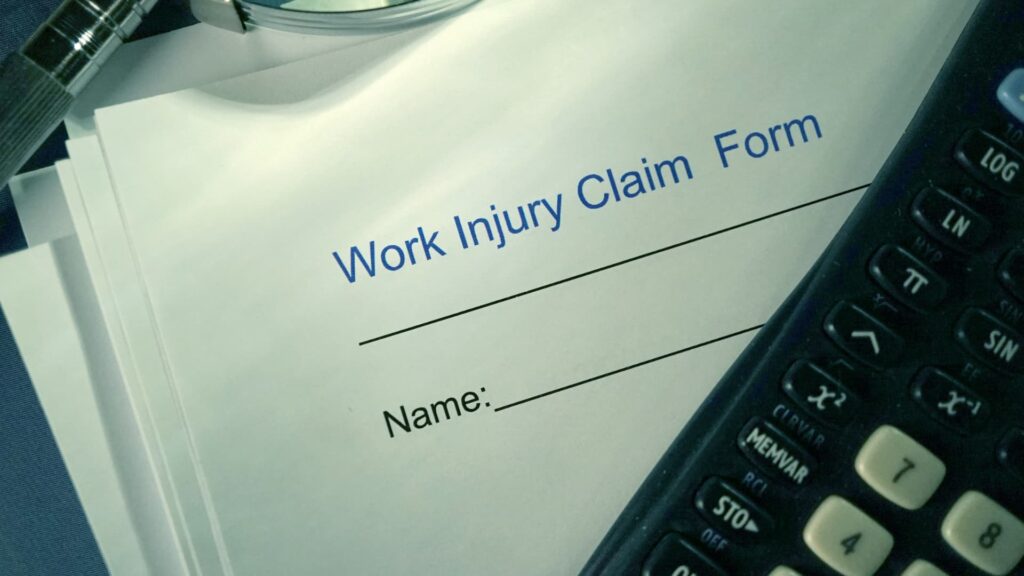
Experienced Workers’ Compensation Lawyers
Workers’ injury attorneys at Rush & Nicholson focus on workers’ compensation cases. We are Iowa employment law experts and know how the system works. If you want smart, independent advice you can trust, you need Rush & Nicholson on your side.

More cases than any other firm in Eastern Iowa

Represented more injured workers than any other firm in Eastern Iowa

More than 100 years of combined experience
Fighting for Workers’ Comp
Work-related injuries can affect any part of the body, such as the back, shoulder, hand arm or knee. Hearing loss and tinnitus (ringing in the ears) can also be caused by the work environment. If you are injured in Iowa, even if your employer is in another state, you have rights under the Iowa Workers’ Compensation Act.
We investigate every injury, no matter how small, to get you compensation for workplace injuries and illnesses, including:
- Strains, sprains, and breaks
- Repetitive stress injury (like carpal tunnel syndrome)
- Illness or injury from exposure to hazardous conditions
Find Help Today
Contact us to get a free initial consultation with an attorney!
Helping Iowans with Workers’ Compensation
We have decades of experience helping injured workers across Eastern Iowa. Our home is Cedar Rapids but we serve workers in cities across the state. Even if your city isn’t listed below, don’t hesitate to reach out for help.
Iowa Workers’ Compensation Resources
Find additional resources from IowaWorkComp.Gov.
Clicking the links means you will leave RushNicholson.com

Attorneys Specialized in Workers’ Comp
Get your case reviewed, for free!
Free ConsultationLearn More About Workers’ Compensation
Check out helpful articles and guides about workers’ compensation law, what to expect when filing, and much more.
How Does Workers’ Compensation Work? A Simple Guide for Injured Workers
There is no excerpt because this is a protected post.
Learn MorePainful Reality: Children are Cheaper to Injure
A new Iowa law purports to allow 16 and 17-year-old kids to work in construction, roofing, manufacturing and other hazardous jobs. The new law is controversial for any number of…
Learn MoreAdding Insult to Injury: Work Injuries and Mental Health
(This piece was originally published in The Prairie Progressive) Workplace injuries reveal the harsh realities many workers face when trying to secure the benefits they are legally entitled to. These…
Learn MoreHealth care for the benefit of businesses, not patients
Imagine you are never allowed to choose your doctor. Imagine you are never allowed to choose your health insurance company. Instead, the insurance company you did not select picks the…
Learn MoreWorkers’ Comp FAQs
Do I have to pay to talk to you about my case?
No, initial consultations are free.
What is a contingent fee agreement?
Many people need legal representation but cannot afford to pay a lawyer’s hourly rate. An alternative to paying by the hour is the contingent fee. Most workers’ comp and personal injury cases are handled on a “contingent fee” basis. The lawyer’s fee is a percentage of (or “contingent” upon) the recovery you actually get on your claim.
The contingent fee percentages we use vary depending upon the nature of the case and other factors. Expenses for your claim are the responsibility of the client. We will prepare a written fee agreement for you and the firm to sign.
What is the Iowa Workers’ Compensation Act?
The Iowa Workers’ Compensation law requires most employers to provide wage loss and medical benefits to employees injured while working. You do not have to prove your employer was negligent.
What is a work injury?
“Injury” is broadly defined under the law. If your condition arises out of and in the course of your employment, it is a work “injury.”
“Arises out of” means your work was a cause of or significant contributing factor to the injury.
“In the course of” means you were injured while at the factory, on the job site, or while furthering your employer’s business.
If you have suffered an injury, you have certain rights and may be entitled to benefits.
What types of work injuries are covered?
There are different types of injuries that may be covered by workers’ compensation:
- Acute Injury: A single traumatic event causing physical injury. It may involve aggravation of a pre-existing condition.
- Cumulative Injury: It gradually develops over time. Frequently caused or aggravated by repetitive work, such as assembly, meatpacking, or up and down steps.
- This can include back, shoulder, hand, arm or knee injuries.
- Hearing loss or ringing in the ears, frequently the result of longtime exposure to loud noise.
- A disease that may be related to your job, like some lung diseases.
- Mental/emotional conditions, either on their own or together with a physical injury.
How are disputes handled?
When a dispute cannot be settled by agreement among the parties, you may file a contested case proceeding before the Iowa Workers’ Compensation Commissioner. While the commissioner does not require it, most employees are represented by legal counsel in a contested case proceeding.
What if I am left with a permanent disability?
You may be entitled to more benefits from your employer for permanent disability. They are paid weekly. How much permanent disability you are entitled to will depend on many factors, including part of your body injured and the severity of permanent physical or mental impairments.
If your injury leaves you permanently totally disabled, you are entitled to weekly benefits for as long as the condition persists.
How much is paid weekly?
The amount paid to you weekly depends on how much you were making before you were injured. There are several different ways that can be used to calculate this payment. The amount paid weekly for total disability is called the “rate.” Rate is used to determine temporary and permanent disability payment amounts.
Any workers’ compensation benefits you receive are not taxable. That is one advantage workers’ compensation benefits have overpayments from a company disability policy or sickness plan.
Who is eligible for workers’ compensation benefits?
Most employees injured in Iowa working in Iowa are eligible for benefits. Employees hired in Iowa or whose employment is principally in Iowa may be eligible for benefits even if they are injured outside the state.
A few types of employees are exempt. If you are uncertain if you are eligible for benefits, you may need to seek the assistance of an attorney.
What should I do if I have a work injury?
Report it. There are important time limits. If you miss a time limit, you may lose your right to benefits.
- Make sure you report the injury to your supervisor and anyone else your employer has designated within the time limits discussed at this site.
- If your employer does not get notice of your injury on-time it may defeat your claim even though you suffered a work injury.
- If you are a union member, you should also tell your union steward about your injury. While the union cannot give you legal advice, it can help guide you through the process.
What if my employer or insurance company denies my claim or does not pay what seems fair?
You have a right to file a formal claim for benefits. A contested case is a legal proceeding that leads to a hearing before a deputy workers’ compensation commissioner. There is no jury trial. Disputes are resolved by an administrative hearing held in front of a deputy or an assistant workers compensation commissioner.
The hearings are much less formal than a jury trial. At the hearing, you have the right to present evidence helpful to your case. The employer gets the same opportunity. After the hearing, the deputy issues a written ruling on if you are entitled to benefits and if so, how much.
The deputy’s ruling can be appealed to the workers’ compensation commissioner. The commissioner reviews the record and issues a “final agency” decision. Sometimes the final decision is challenged in the court system. This is called “judicial review.” Although it doesn’t happen very often, a case can be appealed all the way to the Iowa Supreme Court.
What if I had this problem before, but it got worse on-the-job?
You may still be entitled to benefits if your work aggravated or worsened your condition. A pre-existing condition does not disqualify you from benefits. A worker with a bad back made worse is an example. A company doctor may label it “congenital” and benefits are denied. However, a doctor who more thoroughly investigates the details of your work may find your work activities aggravated your old back condition.
If I have a work injury, what kind of medical benefits do I get?
Your employer must provide and pay for reasonable medical care to treat your injury.
No right to choose:
Unfortunately, Iowa does not give you the right to choose any doctor for treatment and have it paid for by the company. If you want to go to a doctor you choose you probably will have to pay yourself, without your health insurance.
Your employer is required to pay only for the medical care it has authorized. SO MAKE SURE YOUR EMPLOYER HAS AUTHORIZED THE CARE. IF YOU GET UNAUTHORIZED CARE you may be responsible for the bill and not your employer.
Who chooses the medical care?
The employer has the right to choose the medical care and must provide medical care reasonably suited to treat your injury. If you are dissatisfied with that care, you should discuss the problem with your employer (or its insurance carrier). You may request alternate care. If your employer does not allow that care, you may file a petition asking it be ordered by the Iowa Workers’ Compensation Commissioner.
What other benefits are available if I am injured?
If you cannot work because of your injury you may be entitled to “temporary” weekly disability payments.
Disability benefits:
Your employer or its workers’ compensation insurance company may make weekly payments while you are off work or getting reduced hours or pay due to your injury. How much will depend on your job situation. Temporary benefits will end when you return to work or the doctor says you can return to your job or similar work.
If you continue to work after being injured but have to take a job that pays you less, you may be entitled to temporary partial disability benefits. How much will depend upon the facts of your case.
Can the company fire or retaliate against me if I make a worker’s compensation claim?
The Iowa Supreme Court has declared any retaliation by an employer against a worker for making a work comp claim is against the law. If an ignorant employer does retaliate, it can be sued and held responsible for any damages you have suffered.
If you have a protected disability you may also have protection under federal and state laws including the Americans with Disabilities Act, Family and Medical Leave Act, and Iowa and federal civil rights laws.











